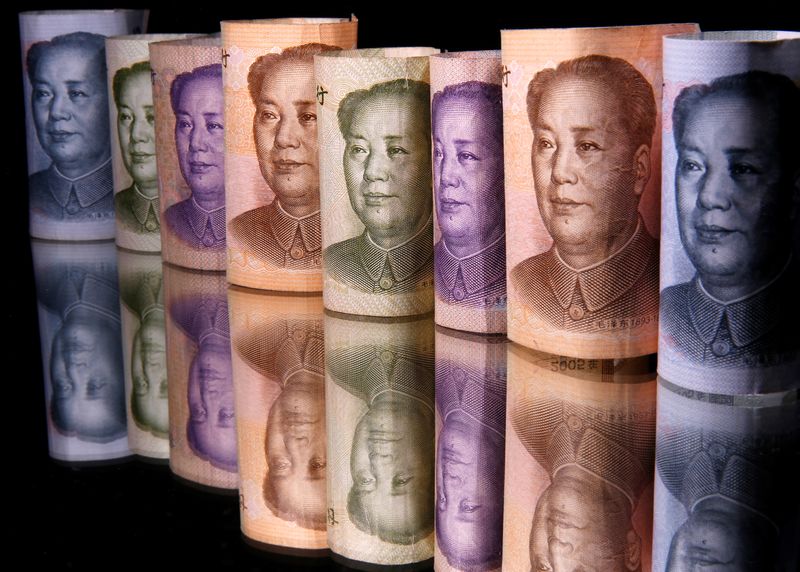By Julie Zhu
HONG KONG (Reuters) -China's central bank has asked major state-owned banks to be prepared to sell dollars for the local unit in offshore markets as it steps up efforts to stem the yuan's descent, four sources with knowledge of the matter said.
State banks were told to ask their offshore branches, including those based in Hong Kong, New York and London, to review their holdings of the offshore yuan and ensure U.S. dollar reserves are ready to be deployed, three of the sources, who declined to be identified, told Reuters.
The simultaneous selling of dollars and buying of yuan could put a floor under the Chinese currency, which has lost more than 11% to the dollar so far this year and looks set for its biggest annual loss since 1994, when China unified its official and market rates.
The scale of this round of dollar selling to defend the weakening yuan will be rather big, one of the sources said.
The People's Bank of China did not immediately respond to a Reuters request for comment.
China's offshore yuan immediately bounced about 200 pips after Reuters' story before last trading at 7.1849 per dollar as of 0935 GMT.
While the yuan's depreciation has been gradual and in line with the decline in major currencies against a dollar buoyed by aggressive Federal Reserve monetary tightening, its decline to the weaker side of 7-per-dollar has raised concerns about domestic sentiment and potential capital outflows.
The offshore yuan moves in lock-step with the onshore unit, but its trading volumes account for about 70% of all yuan FX trades globally, dwarfing the volumes traded on the mainland.
Chinese authorities have intervened in the past in the offshore yuan market to steer the yuan.
Sources said the intervention plan involved using state lenders' dollar reserves primarily. But the total amount of dollar selling is yet to be determined as the yuan's movements are largely dependent on dollar moves and the Fed's tightening trajectory, the source said.
China burnt through $1 trillion of its official FX reserves to prop up the currency after a one-off 2% devaluation in 2015 that roiled global financial markets.
State banks, which usually act as the PBOC's agents in offshore markets, are scrambling to procure more dollars in offshore markets, one of the sources said.
The People's Bank of China did not respond immediately when asked by Reuters about state banks stocking up on dollars.
The latest proposal follows other steps authorities have taken to put a floor under the yuan, through persistently setting firmer-than-expected mid-point fixings, verbal warnings and holding off major monetary easing efforts.

The PBOC has also rolled out policy measures this month, such as increasing the cost of shorting the currency by lowering the amount of foreign exchange financial institutions must hold as reserves and reinstating risk-reserve requirements on currencies purchased through forwards.
Earlier this week, Chinese monetary authorities told local banks to revive a yuan fixing tool it abandoned two years ago as they sought to steer and defend the weakening currency.